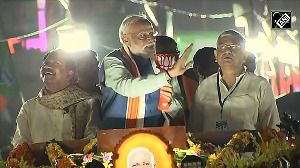I stood in front of the building's entrance for a very long and haunting hour and watched amazing and courageous ordinary men, off the street, fearlessly jump into the wreckage and pull out body after body, mangled and drenched in blood, some injured and some dead.
At one point, just a solitary blood-soaked leg was brought out. And a veil of hollow silence descended on the crowd.
I remember at that moment I just felt like standing there and crying.
Tears for what had happened to our Bombay (it was called Bombay then and I prefer that name). And to India. And tears really for the realisation of the terrible, unimaginable deeds human beings could carry out on each other.
These rescuers loaded the victims into taxis and then other equally heroic volunteers ran, for what seemed like kilometres, in front of each taxi, yelling to clear crowds so the taxis with the wounded could get to the hospitals quick.
Thirteen years later, I found myself on Tuesday, July 11, standing at Sion Hospital, northcentral Mumbai, watching a similar procession of bleeding bodies come past me on a grim train of rushing stretchers.
And I could no longer cry.
I just felt numb.
Somehow I could no longer relate to the fact that I was once again, from the sidelines, viewing a similar, almost identical disaster.
It was too much to take.
I was standing near where some 40 people lay cold in a morgue. And another 40 lay in front of me shattered, bleeding in makeshift beds in a chaotic government hospital. Ambulances whined. Panic rent the air.
I listened to the more upbeat talk of the relatives of survivors, who have come out reasonably unscathed. One could also absorb the dull, quiet misery of relatives of victims who were on the edge of death.
Each person's karma floated in the fetid medicinal air above us. Happiness was juxtaposed with acute sorrow. Again, you felt deadened wondering how and why this karma got allocated the way it did.
At one point a woman, who was sitting passively on one of the seats, got up to make a phone call. It was then that press photographers realised that the entire back of her kurta was covered in blood, and she has come to the hospital with a victim who was being sewn back together around the corner. They all jumped to alert and formed a ring behind her taking pictures, from just a few inches away, as she calmly talked on the phone.
My numbness I realise also resulted from the surreal nature of this experience.
The seven serial train blasts of July 11 were a mirror image of the blasts Mumbai witnessed in March 1993.
There was an almost deja vu quality to the re-occurrence of a disaster on exactly the same scale.
I could not really believe that this is happening again.
That I was again standing and witnessing a parade of death.
I feel, today, both angry and anguished at my numbness. I wonder if exposure to too much sorrow and disaster takes away your ability to feel the depth or implications of a calamity of such enormous proportions.
Is this what it feels like to live in an Israel or an Iraq, where, day after day, one is exposed to so much bloodshed, catastrophe, death and absence of humanity that you become immune?
There is numbness because these events seem like those that could happen in a dream or nightmare or B-grade thriller or a cheap blood-and-gore crime film. Shadowy people, who concoct death, moving silently among us, wreaking havoc on an ordinary city.
It is a dream because only in a dream could this happen again. And again.
And that is when rage creeps in.
This is too much to be borne.
How can this happen again?
How can they do this to Bombay over and over? How dare they?
How can we be exposed to so much blood and terrorism that we are now numb?
I also rage against the fact that I am powerless to do anything other than feel numb.
Time may take away the edge of my/our anger.
It will erase the horror and grief. We will once more live a usual existence going about day-to-day mundane tasks, not remembering that 200 people, who could have been some of us, lost their lives in an inhuman crime that defies description.
There is numbness for the fact that we will forget the awful things we live through, sooner rather than later.
And for the fact that I cannot cry.





